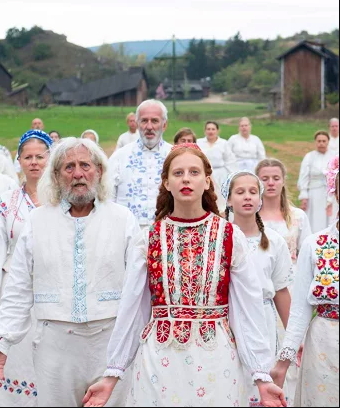*this articles contains spoilers for “Hereditary” (2018) and “Midsommar” (2019)
When a twitter video showing Hannibal Burress looking at his hands with a backing track of “Reborn,” composed by Colin Stetson, from “Hereditary” (2018) made its rounds as a video reaction meme, replies recounted the movie’s harrowing finale. It’s almost as if director Ari Aster wanted to find the perfect piece to complement any viewer’s open-mouthed shock, amplified by the buildup that had started since the first time Charlie (Milly Shapiro) creepily clucked her tongue.
After being cornered into the attic by naked members of his grandmother’s cult and his clearly possessed mother (Toni Collette), Peter (Alex Wolff) launches himself out the window. It’s a violent tonal shift, from a frenzied barrage of demonic events to an eerie ephemeral peace. As Peter lies still on the ground, the opening notes of “Reborn” begin.
It’s a strange track — one that accompanies an even stranger denouement. A newly-possessed Peter is crowned the King of Hell, as cult members around him shout “Hail Paimon!” The only other thing you hear is a fanfare of bells, trumpets and whatever other brass instruments Stetson could find. Peter’s absolute helplessness is framed by his broken nose and blank eyes, which don’t quite make eye contact with the camera. It’s an eerie ending, one that’s unafraid of puzzling and unsettling the viewers.
The music doesn’t try to comfort audiences at all. It starts out soft: a simple melody made up of a few woodwinds, playing a slightly discordant tune. As the track gains momentum, a layer of seemingly sinister bells are added. Then, at the climax, a cacophony of brass instruments — or maybe just one? It’s hard to tell. (As my one friend so eloquently put it, “it sounds like a bunch of brass instruments going ham”) Like the ending, the track serves to confuse. But, that’s just the genius of Ari Aster and Colin Stetson.
Personally, I’m not a horror movie person — at all. But, after watching “Hereditary,” it landed on my personal list of top 5 movies of all time. I was constantly looking for clues to the mystery of “Hereditary,” endlessly looking for new theories or explanations. After watching it three more times, I was starting to feel like I had solved the mystery. So, imagine my excitement upon hearing about the release of “Midsommar.”
As much as I loved the ending of “Hereditary,” the finale of “Midsommar” was so much more satisfying. The burning of Christian (Jack Reynor) at the hands of the newly crowned May Queen, Dani (Florence Pugh), represented so much more than lighting an ex on fire: it captured the dissolution of all the resentment Dani had built up against him; it captured her moving onto her new life, one where she wasn’t inextricably tied to the trauma of her family’s death. It captured the beauty of detangling and purification.
“Fire Temple,” the nine-minute track that accompanies this scene, composed by Bobby Krlic, is a constant upwards climb — layers are only added, never taken away. Around the six-minute mark, a beautiful symphony of string instruments, which the listener can only assume is Dani’s joy, are eventually intermingled with what sounds like the wails of the Hårga people, making the discordant seem beautiful. The music mirrors the traditions of the Hårga people, which Dani at first found horrifying, but are part of a place that Dani now calls home. Again — it’s a feat of musical genius, and one that almost brought me to tears on my first listen (and currently sits at #12 of my top Spotify tracks in the last six months).
There’s something hauntingly beautiful about the way Ari Aster incorporates soundtracks with his already poignant endings. In both movies, the protagonists are finally experiencing calm after a string of increasingly tumultuous events. But the viewer feels purely unsettled and distanced, as Peter gets possessed by a King of Hell and Dani burns her ex-boyfriend alive. The juxtaposition of both is part of the reason why Ari Aster is such a masterful director of the absurd and manipulator of human emotions. The music serves as a form of catharsis for the two characters, as they have no choice but to accept their respective fates.





